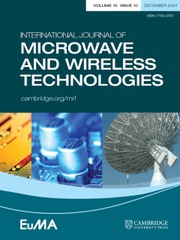InAlN/GaN HEMTs based L-band high-power packaged amplifiers
Published online by Cambridge University Press: 25 February 2014
Abstract
This paper presents power results of L-band packaged hybrid amplifiers using InAlN/GaN/SiC HEMT power dies. The high-power densities achieved both in pulsed and continuous wave (cw) modes confirm the interest of such technology for high-frequency, high-power, and high-temperature operation. We present here record RF power measurements for different versions of amplifiers. Up to 260 W, i.e. 3.6 W/mm, in pulsed (10 µs/10%) conditions, and 105 W, i.e. 2.9 W/mm, in cw conditions were achieved. Such results are made possible thanks to the impressive performances of InAlN/GaN transistors, even when operating at high temperatures. Unit cell transistors deliver output powers of 4.3 W/mm at Vds = 40 V in the cw mode of operation at the frequency of 2 GHz. The transistor process is described here, as well as the amplifiers design and measurements, with a particular focus to the thermal management aspects.
- Type
- Research Papers
- Information
- International Journal of Microwave and Wireless Technologies , Volume 6 , Special Issue 6: Mediterranean Microwave Symposium 2013 , December 2014 , pp. 565 - 572
- Copyright
- Copyright © Cambridge University Press and the European Microwave Association 2014
References
REFERENCES
- 8
- Cited by


